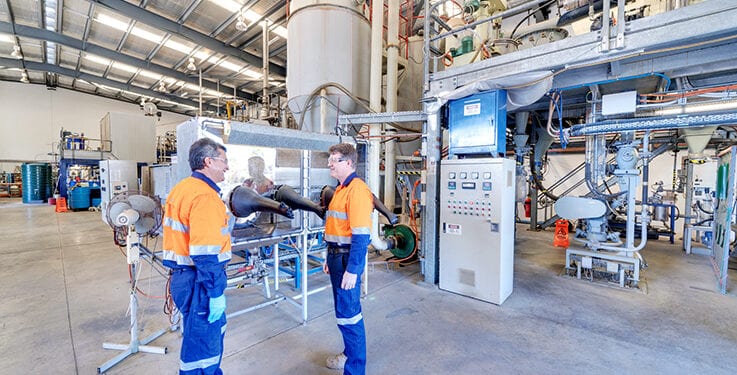Lithium Australia NL’s (ASX: LIT) wholly-owned subsidiary VSPC Ltd has outlined its plans for entering the global battery market.
The company is initially producing LFP cathode powders within China and before expanding its position in other markets as demand increases.
Lithium Australia Managing Director, Adrian Griffin, says LFP batteries provide significant benefits over other established lithium-ion battery (LIB) chemistries; in particular, nickel-cobalt-manganese (NCM) LIBs. Importantly, LFP batteries offer the following advantages:





operation).
Further research on LFP derivatives is likely to narrow the comparative energy-density gap between LFP and NCM battery types, and major battery producers are investing in expanded production, not only for electric vehicle (EV’) and energy storage applications but also for the booming lead-acid battery replacement market.
This environment has seen new investment in LFP batteries by Contemporary Amperex Technology Co. Ltd (aka CATL) and even LFP-powered Teslas being planned for China. Meanwhile, manufacturers of traditional lead-acid batteries are gearing up to produce LFP batteries and in so doing avert a fate similar to that of Kodak all those years ago.
In China, the market for LFP battery-powered trucks and buses is strong, with reduced subsidies in that country driving consumers towards lower-priced EVs in which the use of LFP batteries dominates.
Having adopted a two-stage approach to entering the commercial battery market, VSPC will begin with cathode powder production in China through already established manufacturing facilities.
Mr Griffin said that to that end, VSPC is negotiating with Chinese process- technology company Beijing Saideli Technology Incorporated Company Ltd (SDL) to produce LFP to VSPC specifications in an existing SDL plant.
He said the structure of the pending agreement will not only allow VSPC market entry with little capital expenditure but also meet the final hurdle, that being cost, in its agreement with DLG Battery Co. Ltd (Shanghai) and achieve preferred supplier status. That will occur subsequent to VSPC product meeting DLG’s electro-chemical and physical specifications for LFP cathode material, as tested in commercial-format cells manufactured by DLG.
VSPC plans initial production of up to 1,200 tonnes per annum (tpa) to supplement Chinese supply and also test markets elsewhere. To that end, VSPC is in discussions with cathode producers for the supply of 500-1000 tpa in various jurisdictions by 2022.
Mr Griffin said that while COVID-19 has had an impact on markets everywhere, a rapid recovery in China’s domestic market for LFP is likely. VSPC will expand its strategy by conducting a definitive feasibility study on a commercial plant outside China in 2021.
VSPC research has been augmented by the Australian government via an Advanced Manufacturing Growth Centre (AMGC) grant to evaluate low-cost process consumables, as well as a Co-operative Research Centres Project (CRC-P) grant, which will see VSPC partner with CSIRO, the University of Queensland and others to develop a rapid- charge battery for use in public transport applications, light rail in particular.
“VSPC produces some of the most advanced LFP cathode powders available and has struck a number of deals to pave the way for first commercial production in the near future,” Mr Griffin said.
“The first stage of development will allow market penetration with minimal capital investment and is a convenient means of establishing a customer base. The second stage will enable delivery into expanding and more lucrative markets.”












